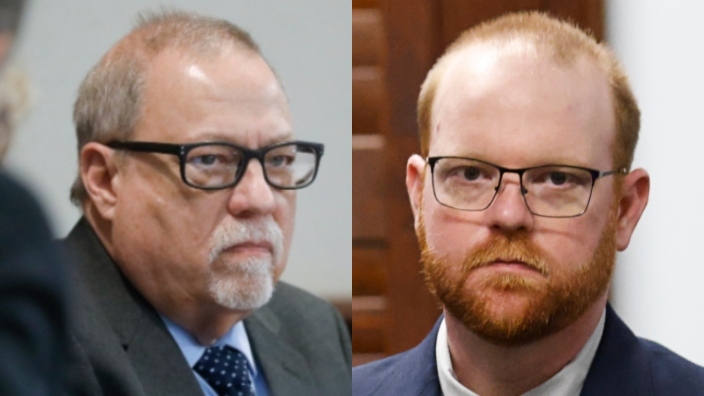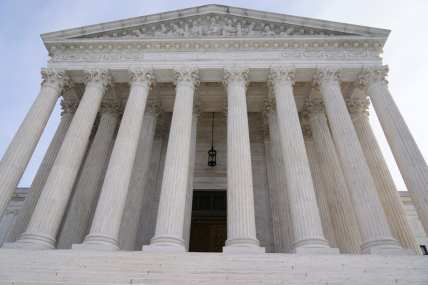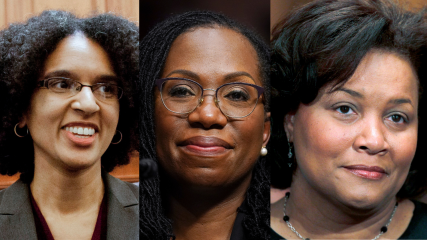Was Arbery killing a hate crime? Jury hears dueling views
A federal hate crimes trial tries to determine whether the McMicheals targeted Arbery strictly because of his race
The man who fatally shot Ahmaud Arbery “was just looking for a reason” to hurt a Black person when he saw the 25-year-old jogging on his street, a prosecutor argued Monday, citing a slew of racist comments and videos Travis McMichael had posted online.
And when McMichael, his father and a neighbor began chasing Arbery, they did so not because he had done anything wrong, but because they assumed he had because he was Black, Christopher Perras said.
When McMichael’s father, Greg McMichael, saw Arbery jogging down the street, “he didn’t grab his phone and call police,” Perras said. “He called his son and grabbed his gun.”
“There’s a big difference between being vigilant and being a vigilante,” said Perras, later adding, “It’s important for you to understand the full depth of the defendants’ racial hatred.”
Perras’ comments came as attorneys began delivering their closing arguments in U.S. District Court, where the hate crimes trial over Arbery’s death began a week ago.

In her closing arguments Monday, Travis McMichael’s attorney told the jury that despite the digital evidence of his racist comments, “there is no evidence of any acts of racial violence by Travis McMichael.”
Attorney Amy Lee Copeland also said there was no evidence that McMichael “ever spoke to anyone about Mr. Arbery’s death in racial terms.”
It’s been nearly two years since the 25-year-old Arbery fell dead from two shotgun blasts on Feb. 23, 2020, after a five-minute chase through the Satilla Shores subdivision just outside the port city of Brunswick. The slaying was captured in a graphic cellphone video that sparked outrage far beyond Georgia.
Basic facts of the case aren’t disputed. The McMichaels armed themselves and chased Arbery in a pickup truck after he was spotted running past their home on a Sunday afternoon. A neighbor, William “Roddie” Bryan, joined the pursuit in his own truck and recorded the video of Travis McMichael firing the fatal shots at point-blank range.
The McMichaels and Bryan were all convicted of murder last fall in a Georgia state court. The U.S. Justice Department charged them separately in federal court with hate crimes, alleging that all three men violated Arbery’s civil rights and targeted him because he’s Black. They are also charged with attempted kidnapping, and the McMichaels face counts of using guns in the commission of a crime.
Regardless of the outcome of the hate crimes case, the McMichaels have been sentenced to life in prison without parole for their murder convictions. Bryan also received a life sentence, with parole possible only after he’s served at least 30 years.
The federal hate crimes trial is all about whether racism motivated the pursuit and killing of Arbery. Legal experts have said that’s tougher to prove than the crime of murder. The McMichaels and Bryan have all pleaded not guilty.
Summarizing previous racist slurs the trio had made, Perras remarked, “The defendants didn’t just make racial assumptions; they made racial decisions. They chose to act on those assumptions.”
The defendants’ reactions to Arbery’s death was further evidence of their racial animus, said Perras, who noted that none of them tried to aid him after he was shot. Instead, Greg McMichael spoke to police “like a man who just came back from a hunting trip and wanted to talk about the thrill of the hunt.”
The McMichaels and Bryant saw Arbery as an animal “and they treated him like an animal,” Perras said.
Defense attorneys have insisted that the trio pursued Arbery based on an earnest, though erroneous, suspicion that he had committed crimes in their neighborhood. Before the day of the shooting, security cameras had recorded Arbery several times inside a home under construction a few doors down from the McMichaels’ house. Greg McMichael told police he recognized Arbery as he came running out of the same unfinished house the day of the shooting.

Greg McMichael’s attorney, A.J. Balbo, said Monday that his client had previously confronted white people who were suspected of possibly committing crimes in the area. Balbo said his client didn’t chase Arbery because he was a Black man, but because he was “THE man” who had been seen in the house.
Security videos showed Arbery taking nothing from the construction site. An officer told the McMichaels there was no evidence of him stealing. Bryan, who knew nothing of the security footage, told investigators he assumed Arbery had done something wrong when he ran past Bryan’s house with the McMichaels in pursuit.
Bryan’s attorney, Pete Theodocion, argued Monday that it was “entirely reasonable” for his client to assume that a truck he recognized as belonging to someone in the neighborhood was chasing Arbery because he had done something wrong.
The chase and Bryan’s participation in it “would have happened regardless of race, based on the circumstances,” Theodocion said. He said the government has not provided evidence “that shows Roddie to be obsessed with race,” or that he has “a hatred of African Americans.”
FBI agents uncovered roughly two dozen racist text messages and social media posts from the McMichaels and Bryan in the years and months preceding the shooting.
In 2018, Travis McMichael commented on a Facebook video of a Black man playing a prank on a white person: “I’d kill that f—-ing n—-r.” Greg McMichael had posted a Facebook meme saying white Irish “slaves” were treated worse than any race in U.S. history. And for several years on Martin Luther King Jr. Day, Bryan wrote messages in which he mocked the holiday honoring the civil rights leader.
Some witnesses testified they heard the McMichaels’ racist statements firsthand. A woman who served under Travis McMichael in the U.S. Coast Guard a decade ago said he made crude sexual jokes after learning she had dated a Black man and called her “n——r lover.” Another woman testified Greg McMichael had ranted angrily in 2015 when she remarked on the death of civil rights activist Julian Bond, saying, “All those Blacks are nothing but trouble.”
Have you subscribed to the Grio podcasts, Dear Culture or Acting Up? Download our newest episodes now!
TheGrio is now on Apple TV, Amazon Fire, and Roku. Download theGrio today!


